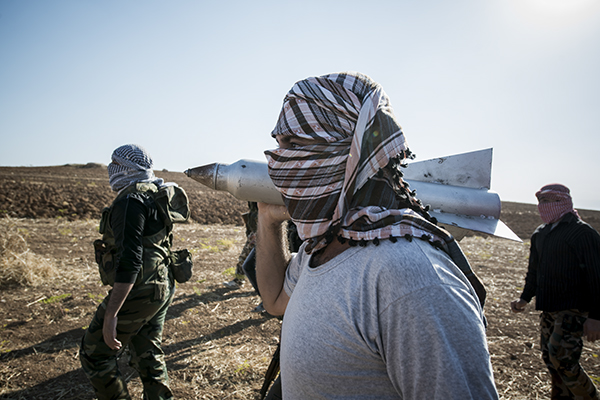Adam Baczko, Gilles Dorronsoro, and Arthur Quesnay write for NORIA, “Between Al Qa’eda and the Syrian Regime: A Path Out of the Current Crisis”
The introduction to the report:
The recent negotiations between Russia and the United States over the use of chemical weapons have turned in favor of Bashar al-Asad. After having threatened to use force against the Syrian regime, Washington has finally agreed to a United Nations Security Council resolution which is non-binding for Syria. Indeed, if Damascus was to not comply and to use chemical weapons once more, the issue would have to be brought back to the Security Council, where Russia can veto any resolution in favor of the use of force.
Indirectly, the negotiations and the ensuing resolution are strengthening the legitimacy of Bashar al-Asad, which has become again the main interlocutor of the international community. Simultaneously, they are weakening the political institutions of the insurgency, which are suffering a loss of confidence because of the recent turn of events. In the end, the negotiations and the resolution are only concerned with chemical weapons, and even if they would be applicable, they do not offer any credible prospect to terminate the conflict.
In theory, the current situation could lead to four different outcomes: a victory of the regime, a negotiated settlement, an indefinite continuation of the war and a rebel victory. While the two first possibilities are extremely unlikely, the third one is undesirable and the last, though acceptable, is full of pitfalls and requires action.
A) At the moment, a victory of the regime can be ruled out. The limited progress made by Damascus in spring and summer 2013 can only be explained by the assistance—whether in terms of arms or fighters—it received from Iran, Iraq and Hezbollah. As long as the Turkish and Jordanian borders remain open, the regime will be unable to regain control of the country. Help will continue to come from the Gulf States, and Saudi Arabia’s opposition to Iran has led it to make an irrevocable commitment to the rebels. Since the spring 2013, more weapons have been coming to the insurgency from the Gulf States, with direct results: in the north, the east and the south, the insurgency has consolidated its positions.
B) A negotiated settlement to the conflict is unrealistic. Even if the United States and Russia would find an agreement, Washington cannot force Saudi Arabia, Jordan and Turkey to stop their support to the insurgency. Therefore, the current American strategy is mostly resulting in a loss of leverage over the rebels, which are depending more and more exclusively on regional powers. In addition, the Syrian regime keeps radicalizing. The security services are still arresting and torturing the very activists which might have mediated with the insurgency. The repeated use of chemical weapons is another step in the same direction. Finally, no groups fighting on the ground would currently accept to participate in a negotiation process and the National Coalition explicitly declared that it would not be part of it.
C) In fact, the exclusive focus on a negotiated settlement will result in an indefinite continuation of the war. Such a scenario would lead to the exacerbation of regional tensions, direct threats to Western security caused by the presence of foreign jihadists in Syria, and huge costs incurred by the continuous flow of refugees (already more than two million). Furthermore, the Damascus regime has already proven its ability to do harm, notably by manipulating terrorist groups.
D) A rebel victory is then left as the only acceptable scenario. But a legitimate concern for Western countries is that Western aid would fuel the victory of radical jihadist groups, notably the ISIL (Islamic State in Iraq and the Levant), the Syrian branch of Al Qaeda in Iraq. Yet unlike the FSA, they do not depend on the West to provide them with arms, which come from Iraq. Furthermore, this Al Qaeda affiliate is still a long way from dominating the opposition, let alone Syrian society, which widely rejects its extremism. Still, without the delivery of adequate, properly targeted aid, a few thousand radical fighters could take hostage a real popular movement, further closing the political space in the Arab countries that already suffered a blow with the military coup in Egypt. The rise of radical groups and the weakening of the Free Syrian Army are directly proportionate to the distribution of foreign resources.
In the end, whatever the American strategy is, supporting the institution-building process in rebel-held areas must become a priority. Whether the United States favors a negotiated settlement, a rebel military victory or even an indefinite continuation of the war, it needs to support the building of a large police force to back the nascent civil administration and discipline the armed groups. In a negotiation process, such institutions will be essential both to unify the insurgency inside Syria for the talks and, if a settlement is to be found, to force compliance to the groups on the ground.
Similarly, if Washington decides to push for a rebel victory, it should start building early an alternative state to the Bashar al-Asad’s regime in order to smooth the transition. Finally, even if the United States lets the war continue indefinitely, such institutions will be fundamental to stabilize the rebel-controlled areas and to marginalize Al Qaeda. Consequently, aid must be structured to facilitate a more coherent approach among the institutions that grew out of the uprising. Partners exist within Syria, progress is being made in the construction of civil institutions, sometimes, as in Aleppo, to a remarkable degree.

